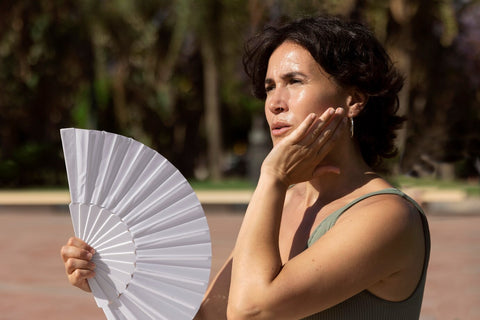Menopausal disorders such as hot flashes or night sweats are caused by a decrease in estrogen levels in the blood. Menopausal hormone therapy is often the recommended treatment for hot flashes or genitourinary syndrome, but other options may even be complementary to it. Each woman must find the most appropriate treatment according to her specific and unique needs.
For all these symptoms, there are treatments and natural remedies that can help you better cope with each stage of menopause.
Natural remedies
In addition to medical treatments, there are natural treatments that also work when symptoms are mild. Before taking them, consult your gynecologist, since being natural does not mean that they are harmless.
Hot flashes . In addition to soy, red clover, sage, and natural cypress essential oil are plants that can help reduce hot flashes, one of the most bothersome symptoms of menopause.
Anxiety and insomnia . Passionflower, valerian or hawthorn can help you relax and feel less stressed. If you are feeling down, you can use St. John's wort. But talk to your doctor first, as this plant can interact with other medications, for example, antidepressants.
Cholesterol and triglycerides . Although they do not work miracles, as part of a healthy diet and if you exercise, remedies such as evening primrose, garlic, borage or red rice can help you keep cholesterol and triglyceride levels at bay, which tend to increase at this stage of life.
Lack of sexual desire . This is another symptom associated with menopause and one that worries many women. There are remedies that can help, such as Andean maca or damiana.
Vaginal dryness . This is also a very annoying symptom and can affect other aspects of a woman's life, such as her relationship with her partner. In this regard, there are hormone-free gels and tablets that can help improve lubrication as well as sexual desire.
Natural treatments
Data from the United States indicate that 8 out of 10 menopausal women with hot flashes use alternative treatments. The most frequently used alternative remedies are:
Phytoestrogens . These are plant compounds that resemble estradiol, a female hormone. Several of these phytoestrogens have been evaluated in scientific studies to determine their usefulness in controlling menopausal symptoms.
Soy isoflavones are present in many supplements and are usually bound to glucose (sugar) in plant compounds. Their effectiveness depends on their ability to be released from said glucose, an action carried out by intestinal bacteria. Some studies have observed that soy compounds may be beneficial in controlling hot flashes and night sweats. Isoflavones should NOT be taken by women with a history of breast cancer or endometrial cancer.
Flaxseed . Flaxseed is a seed rich in phytoestrogens. Although it is commonly used to treat menopausal symptoms, a review of different studies conducted with this substance has shown that it is not effective.
Red clover or purple clover . Contains 4 isoflavones: daidzein, genistein, formononetin and biochanin A. A study shows that it effectively reduces the intensity of menopausal symptoms.
Evening primrose oil . This is a popular treatment for hot flashes. However, there are no studies that have proven its usefulness.
Black cohosh . This is an American plant that was initially thought to be rich in phytoestrogens. It has now been shown that it is not, but that it could alleviate the symptoms of menopause by acting on certain areas of the brain.
Recommendations
There are various recommendations aimed at improving the quality of life of women at this stage, so choosing natural alternatives to avoid the possible adverse side effects of pharmacological therapies is a good option.
Foods rich in calcium and vitamin D. A diet rich in calcium and vitamin D is essential to prevent bone loss associated with menopause and to reduce the risk of hip fractures due to weak bones. Eat dairy products such as yogurt, milk and cheese, as well as green leafy vegetables, tofu, beans or sardines.
Eat more protein . Eating protein regularly can help prevent the loss of muscle mass that occurs with age and will contribute to weight loss and better balance your mood and sleep. Foods rich in protein include meat, fish, eggs, legumes, nuts and dairy products.
Maintain a healthy weight and avoid gaining weight . It is very common to gain weight during this time, but a healthy weight can help alleviate many of the most severe symptoms of menopause and prevent disease. Having excess body fat increases the risk of developing heart disease and diabetes, as well as being a trigger for hot flashes and night sweats.
Fruits and vegetables . A diet rich in fruits and vegetables will help you maintain healthy bones and prevent weight gain and certain diseases. They are low in calories and will make you feel fuller.
Avoid caffeine, alcohol and spicy foods . Certain foods can trigger hot flashes, night sweats and mood swings, especially when you eat them at night. Avoid these and make a list of those you notice don't agree with you.
Diet high in phytoestrogens . These are naturally occurring plant compounds that can mimic the effects of estrogen in the body and help balance hormones. Some foods you can include in your diet are soy, tofu, tempeh, flax seeds, and sesame seeds. You can reduce cholesterol and blood pressure, as well as reduce the intensity of hot flashes.
Drink plenty of water . Two liters of water a day can help prevent weight gain and reduce symptoms of dryness caused by reduced estrogen levels. It can also reduce bloating that can occur due to hormonal changes.
Eliminate refined sugar and processed foods . A diet high in refined carbohydrates and sugar can cause sharp spikes and drops in blood sugar, making you feel especially tired and irritable and may contribute to bouts of depression and poor bone health.
Include exercise . Get active and make resistance, strength and impact exercise part of your daily routine. It is effective in treating hot flashes and night sweats. It also improves your energy and metabolism, is good for your joints and bone health, reduces stress and promotes better sleep.
Seek support from natural supplements . More and more women are taking natural supplements to relieve the symptoms of menopause; at Madequa we have the natural supplements and vitamins you need at every stage, formulated, supervised and approved by doctors and specialists.
Each one is designed to meet the needs of each phase, premenopause, perimenopause and postmenopause, relieving symptoms and promoting comprehensive well-being in this period of change… Become part of the Madequa community and start feeling better.
References
Navarro M.ªC, Losa F, Beltrán E, Ortega M.ªT, Carretero M.ªE, Cañigueral S, Bachiller I, Vila R, Alonso M.ªJ, López-Larramendi JL, Allué J, Martín M, Cornellana M.ªJ, Mendoza N, Castelo-Branco, C. Natural products for mature women, MenoGuía AEEM. First edition 2022.
Navarro MC, Losa F, Alonso MJ, Bachiller I, Beltrán E, Estivill C,Herrera A, Ortega T, Prado A, Mendoza N, Natural products in sleep management, MenoGuía AEEM. First edition 2024.
Mainini G, Ercolano S, De Simone R, Iavarone I, Lizza R, Passaro M. Dietary Supplementation of Myo-Inositol, Cocoa Polyphenols, and Soy Isoflavones Improves Vasomotor Symptoms and Metabolic Profile in Menopausal Women with Metabolic Syndrome: A Retrospective Clinical Study. Medicine (Kaunas). 2024;60(4):598. doi: 10.3390/medicine60040598.
Monteleone P, Mascagni G, Giannini A, Genazzani AR, Simoncini T. Symptoms of menopause - global prevalence, physiology and implications. Nat Rev Endocrinol. 2018 Apr;14(4):199-215. doi: 10.1038/nrendo.2017.180.
Nappi RE, Chedraui P, Lambrinoudaki I, Simoncini T. Menopause: a cardiometabolic transition. Lancet Diabetes Endocrinol. 2022;10(6):442-456. doi: 10.1016/S2213-8587(22)00076-6.
Hot Flashes: What Can I Do? (nd). National Institute on Aging.2017.
Maricela Jiménez López . Natural treatments for menopause. Better with health. 2023.




Comments (0)
There are no comments for this article. Be the first one to leave a message!